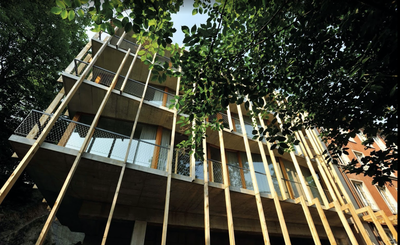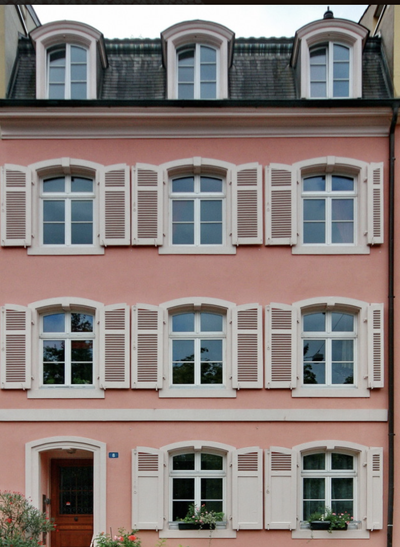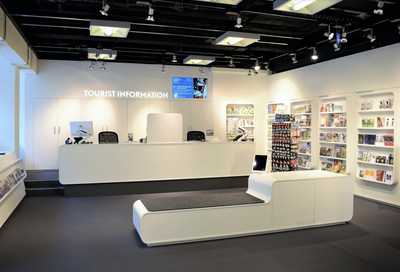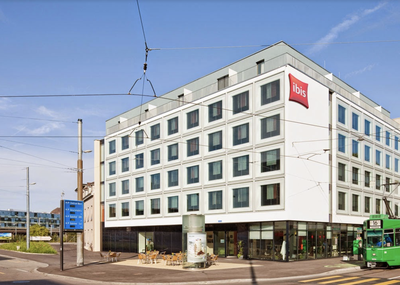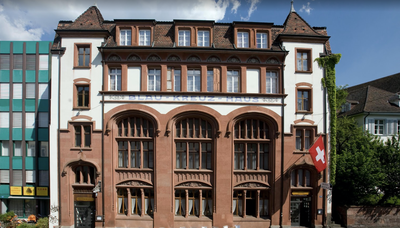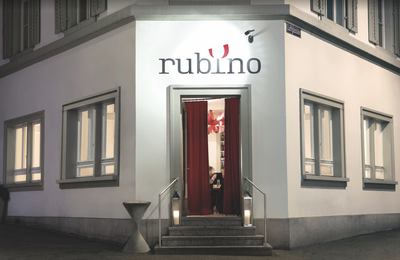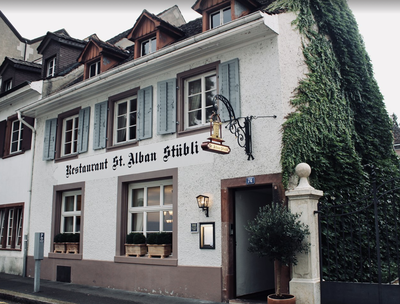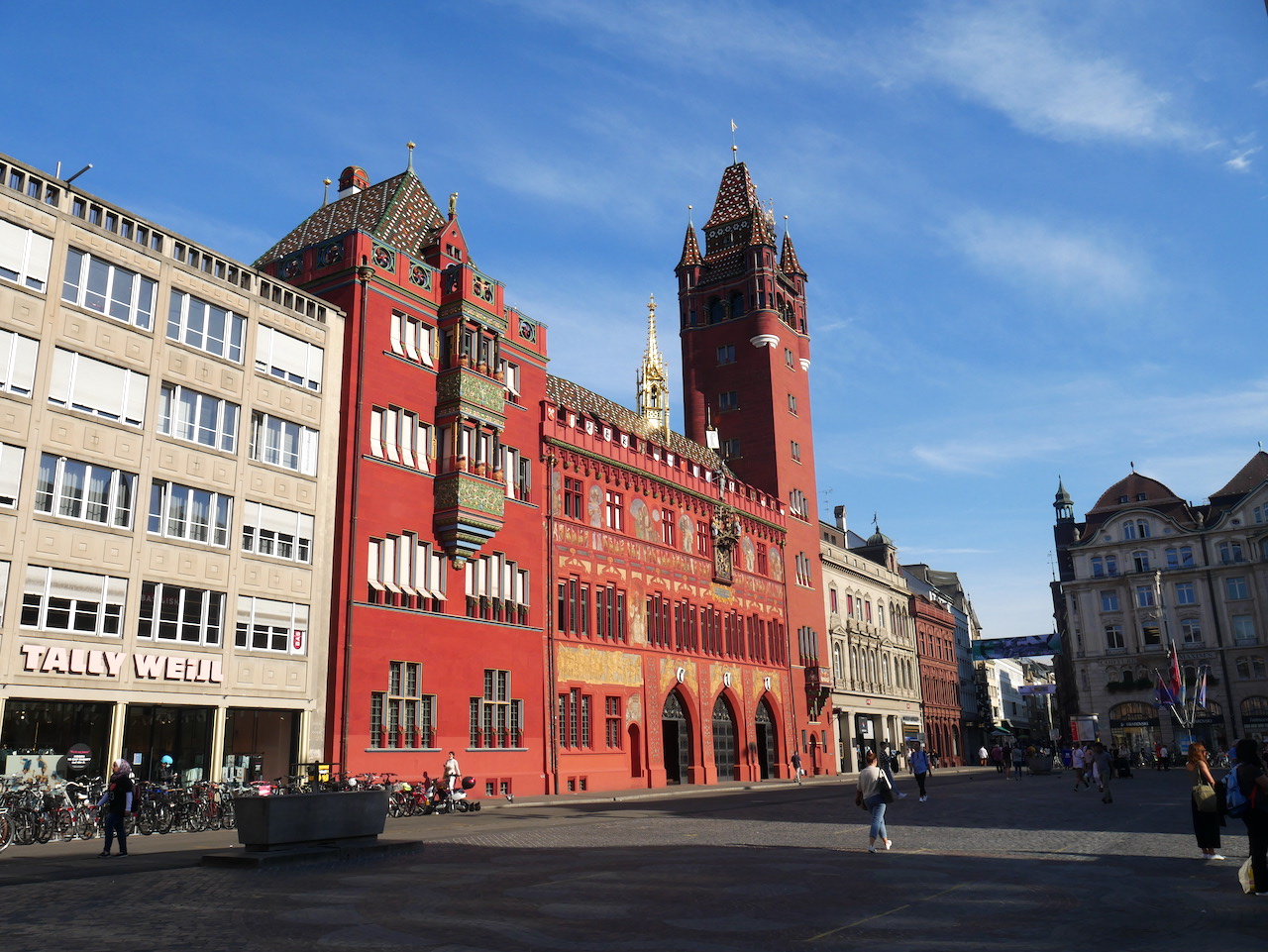
8. Ottmarsheim to Basel
12 points of interest
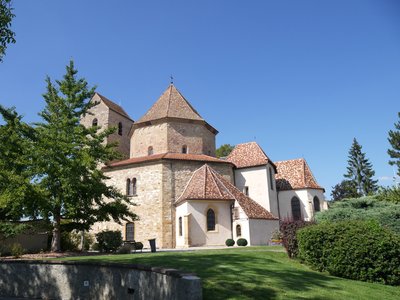
Chevet de l’église abbatiale d’Ottmarsheim - Wikimedia Commons Ralph Hammann HistoricalAbbey Church of St. Peter and St. Paul in Ottmarsheim
The agricultural village of Ottmarsheim was founded on the old Roman road that linked Basel to Strasbourg along the Rhine (French-German border). With its Merovingian necropolis dating from the 6th and 7th centuries, it is named after Othmar of St. Gallen, the founding abbot of St. Gallen Abbey in the 7th century on the site of the burial place of the Irish monk Gall, companion of St. Columban.
The Church of St. Peter and Paul in Ottmarsheim is an 11th century church. Founded by Rudolph of Altenburg, one of the founders of the House of Habsburg, and dedicated to the apostles of Christ St. Peter and St. Paul, it is famous in Alsace and the Upper Rhine for its remarkable and rare architecture of a church with an octagonal central plan in early Christian style, Byzantine, pre-Romanesque, Carolingian, and Ottonian, inspired by the Palatine Chapel in Aachen of the Carolingian Emperor Charlemagne and the Church of the Holy Sepulchre in Jerusalem (the tomb of Christ).
More info: Wikipedia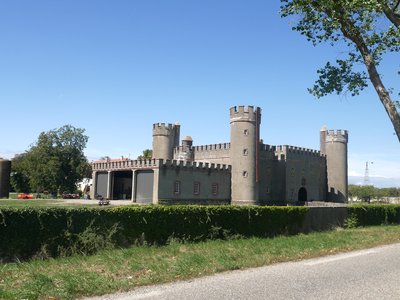
Château Burrus à Hombourg - les Amis de saint Colomban HistoricalBurrus Castle in Homburg
The Domaine de Hombourg is an original place in Alsace which has belonged to great industrialists such as the Koechlin family, and since 1922 to the Burrus family. It combines several activities: a farm with a stable that imitates the architecture of a medieval castle dating from the 20th century. Then at the back, a 19th century castle, around which a golf course has developed. The guided tour takes place in the farmhouse and allows you to understand the historical and technical evolutions of this agricultural estate and highlights the imprint of these industrial families. Reservation on line or on 03 89 35 48 48 at the latest 48 hours in advance.
www.tourisme-mulhouse.com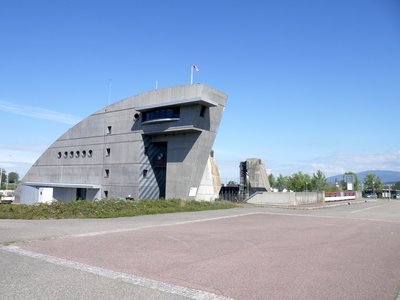
Écluse du Corbusier à Niffer à la jonction du canal d’Huningue et du Rhône au Rhin sud - les Amis de saint Colomban PanoramicLe Corbusier lock at Niffler
The Kembs-Niffer lock is a lock in Alsace inaugurated on 15 April 1961. It is located in the commune of Niffer, in the Haut-Rhin. The control tower and the administrative building, built by Le Corbusier, were registered as a historical monument by decree of 11 March 2005.
It should not be confused with the main lock, with its semi-circular roof, built in 1995 for the (abandoned) project to widen the Rhone-Rhine canal. The Le Corbusier lock is located a few hundred metres upstream from the main lock.
Further information: Wikipedia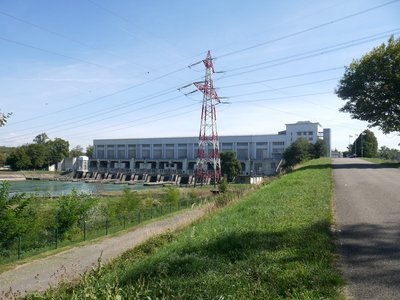
Usine hydro-électrique de Kembs - les Amis de saint Colomban TouristKembs Hydropower Plant
The construction of the power station was started in 1928 by the Rhine Electric Power Company. It was commissioned in 19324.
During the Second World War, parts of the power station and the dam were destroyed and had to be subsequently restored. In 1946, the power station was nationalised with the creation of the company Electricité De France (EDF).
Following the renewal of the concession in 2010, EDF began a campaign of works lasting more than 5 years, including the renaturation of approximately 100 hectares of the Rhine Island, with the re-flooding of an old branch of the Rhine known as "the Little Rhine". As part of this project, an 8.4 MW restitution plant is also being built. It will generate the necessary fish attraction flow rate to attract fish to the upstream fish pass that allows them to pass through the hydroelectric structure.
This work was completed in 2016. The fish pass includes a pseudo-natural river as well as a fishway with basins that allows highly migratory fish (salmon, shad, lampreys, eels, etc.) present in the old Rhine to access the Grand Canal d'Alsace and then go up to Basel.
More information : Wikipedia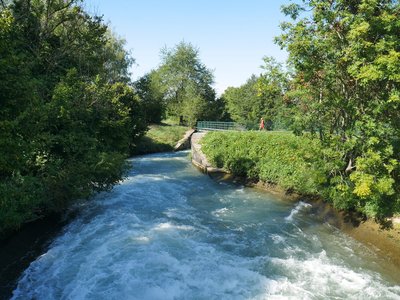
La Via Columbani dans la petite Camargue alsacienne - les Amis de saint Colomban PanoramicThe little Alsatian Camargue
The Petite Camargue alsacienne is a national nature reserve located in Alsace. Listed in 1982, it covers an area of 904 hectares and protects a mosaic of environments in the former major bed of the Rhine.
It includes in particular the Rhine Island, located between the river and the Grand Canal d'Alsace. It has 717 ha of land surface and 187 ha of water for a total of 904 ha.
It is crossed by the Augraben, the only tributary of the Rhine in the Haut-Rhin department, which gives its name to the commune of Rosenau.
more information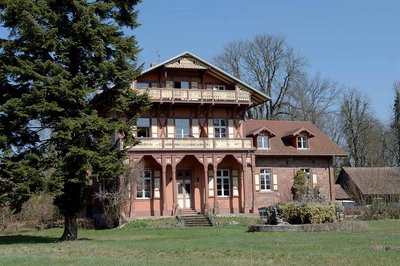
La pisciculture impériale à Rosenau - Amis de saint Colomban TouristHuningue Imperial Fish Farm
It was in 1852, under the reign of Napoleon III, that the Imperial Fish Farm in Huningue was founded. The first industrial fish farm in Europe, built in the heart of the current reserve of the Petite Camargue Alsatienne, its reputation will be immense. The establishment is considered a model. In addition to river trout, it will build its reputation on the reproduction of many other species: lake trout, Rhine salmon.
more information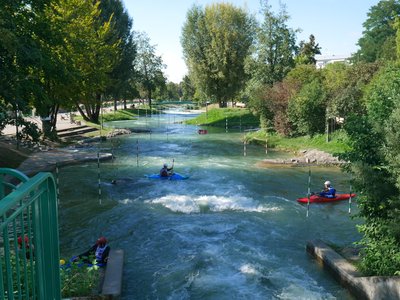
Parc des Eaux Vives à Huningue - les Amis de saint Colomban TouristParc des Eaux Vives in Huningue
The white water park has been built on a bypass of the Huningue canal. It is not only a place to practice canoeing, rafting and hydrospeed, but it also has a climbing wall available to its members.
more information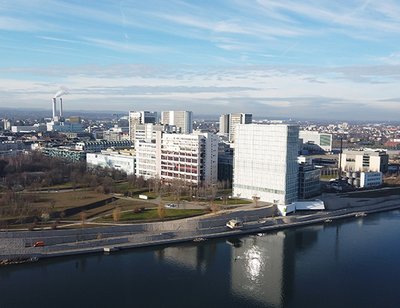
Campus Novartis à Bâle avec la Via Columbani sur la rive gauche du Rhin - wikimedia Commons TouristCampus Novartis Basel
The Novartis campus headquarters in the St. John's district consists of office buildings, laboratories and production lines, as well as a campus for science, innovation and exchange. First-class architecture and design for a modern working environment in the heart of the city.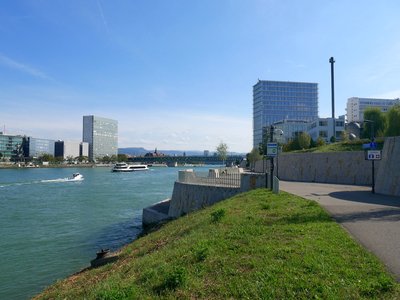
Vue de Bâle depuis la Via Columbani au bord du Rhin avec la frontière. - les Amis de saint Colomban PanoramicThe Rhine in Basel
The Rhine is the emblem of Basel. As an important commercial transport route, the river has made a significant contribution to the development of the city and adds to the quality of life .
The Rhine is a vital artery, a place of leisure, an inspiration for people, life and architecture in the city. In summer, the people of Basel enjoy coming here. Sun-lovers, walkers, students and businessmen like to recharge their batteries on its banks.
In addition, many locals share the same curious passion: swimming in the Rhine. Anyone who joins the swimmers knows why the Mediterranean suddenly seems so close.
In summer, life is in full swing on the banks of the Rhine on the Kleinbasel side! In the warm months, thousands of people come to bathe in the cool water. You, too, put your clothes in a waterproof "Wickelfisch" swimming bag and let yourself be carried by a gentle current through the picturesque scenery of the old town.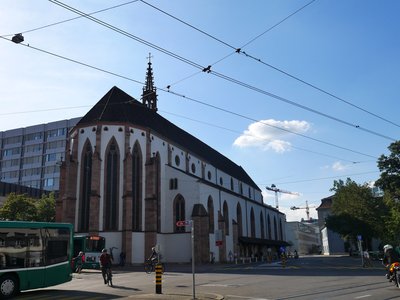
L’église catholique des Prédicateurs à Bâle - les Amis de saint Colomban TouristThe Catholic Church of the Preachers in Basel
The Catholic Church of the Preachers was built between 1233 and 1237 as a monastery church of the Dominican Order. During the reconstruction from 1262 to 1269, it was one of the first churches on the Upper Rhine to be adapted to the Gothic style. In 1269, the choir was consecrated by the famous Dominican Albertus Magnus, Bishop of Regensburg.
In 1356, the Basel earthquake destroyed a large part of the church. During the renovations in the following decades, frescoes depicting Mary, John the Baptist and the Dominican Vincent Ferrer were created. During the Council of Basel from 1431 to 1449, the church was widely used by the participants.
The nave is separated from the choir by a partially transparent rood screen.
The small wooden turret on the crest was replaced in 1423 by a stone bell tower.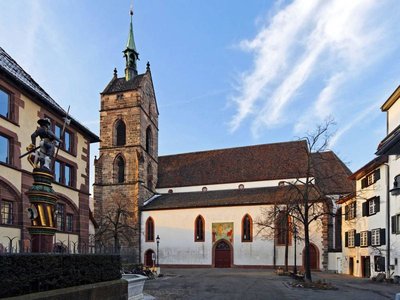
Église réformée protestante Saint-Martin à Bâle - Basel.com TouristMartin Church in Basel
St. Martin's Church is a Protestant Reformed church in the city of Basel. It dominates the old town of Grossbasel, situated at the northern end of the Münster hill. It is considered to be the oldest parish church in Basel.
The lower parts of the tower floor and parts of the west façade date from 1287, while the choir polygon and the north and south façades are mainly dated to the end of the 14th century.
The church was considerably renovated and rebuilt in 1851, when the facades were considerably modified and a first concert stage was erected inside in the rood screen square. Already at that time, St. Martin's Church was used as a concert church and for various state events. Above the south portal, St. Martin has been depicted in a mural by Hans Rohner since 1922. The interior of the church is decorated with numerous epitaphs.
Text source: Wikipedia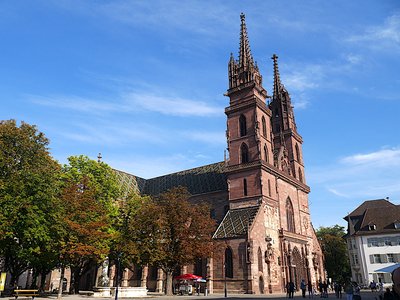
Cathédrale protestante Notre-Dame à Bâle - Les Amis de saint Colomban CulturalBasel Cathedral
The Protestant cathedral is recognized as the emblem of Basel. Built of pink sandstone in 1019 in Romanesque style, it was modified over the centuries, particularly after the earthquake of 18 October 1356, when the damaged parts were rebuilt in Gothic style. The St Gall's Gate, which opens onto the southern transept, was particularly resistant to the earthquake. Inside is also the tomb of the Dutch scientist Erasmus of Rotterdam, who died in Basel in the 16th century.
Description
Start at the abbey church of Saints Pierre and Saint Paul in Ottmarsheim, turn left into rue du Général de Gaulle, second street left into rue de Hombourg, cross rue du Port straight ahead towards Kembs, cycle route, pass under the La Comtoise motorway
- Left at the second crossroads, right on the tarmac road. In Hombourg turn left into rue des Landes, left into rue du Canal d'Alsace, right into rue de Niffer, left into a gravel road,
- Right at the crossroads, straight ahead on a dirt track, cross the D 561 straight ahead to Niffer rue du Moulin
- Right at the crossroads, left on rue Principale D 48, third street on the right on rue de Schlierbach, turn left through the main lock of Niffer, left through the secondary lock of Kembs-Niffer
- Left on the cycle track under the D 468, stay on the cycle track under the D 152, follow the Huningue canal, after the marina cross the canal, left, follow the canal on your left for 6,000 metres
- In Rosenau after passing under the D 21.I turn left to cross the canal, right to follow the canal, right at the next bridge to cross the canal left to follow the canal to the Rhine
- Turn right on the Rhine quay, the Lanquedoc Brigade quay, Elsässersheinweg, after passing under the Dreirosenbrücke bridge, turn right in front of the second Rhine ferry, then left on the Blumenrain, straight ahead on the Schifflände, Rheinsprung, take the stairs on the right to go round the St. Martin's church, left on the Martingässlein, left on the Markplatz, left on the Shlusselberg, then right on the Cathedral square.
- Departure : Abbey Church of St. Peter and St. Paul, 1 rue du Couvent, 68 490 Ottmarsheim
- Arrival : Basel Cathedral, Münsterplatz, 4051 Basel
- Towns crossed : Grand Est and Basel-Stadt
Altimetric profile
Transport
Report a problem or an error
If you have found an error on this page or if you have noticed any problems during your hike, please report them to us here:
Close by12
- Information


